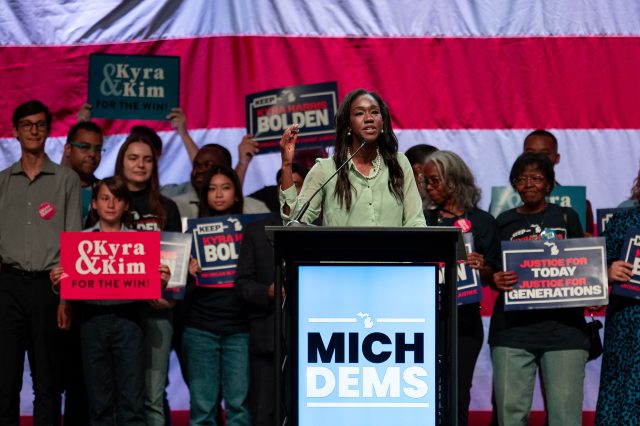[ad_1]
Editor’s Note: Alec Hughes is a former Daily staffer. Hughes did not contribute to this article.
With the 2024 election less than a month away, Michigan voters are gearing up to decide which justices will fill the two vacancies in Michigan’s Supreme Court.
The Michigan Supreme Court has two seats up for election this year as two current judges’ eight-year terms end. Justice David Viviano is retiring, opening a spot contested between Kimberly Thomas and Andrew Fink. Justice Kyra Harris Bolden is running for reelection against Patrick W. O’Grady. Currently, Democratic-backed justices hold a 4-3 majority on the Michigan Supreme Court.
Bolden made history as the first Black woman to serve on the state’s highest court after she was appointed by Gov. Gretchen Whitmer in 2022 to fill a vacancy left by former Chief Justice Bridget Mary McCormack. During a recent campaign stop in Escanaba, Bolden emphasized her connection with Michigan and its people, highlighting her understanding of the significance of the courts’ decisions.
“I really enjoy bringing Michiganders with me to the table when making really tough decisions as a Michigander,” Bolden said. “I understand the weight of my decisions, and I believe that my thoughtfulness, diligence and commitment to justice make me a great candidate to retain my seat for Michigan Supreme Court.”
O’Grady served as chief judge from 2008 to December 2023 for the 15th Circuit Court and Probate Court in Branch County, where he presided over nearly 14,000 cases in criminal and civil lawsuits.
The election between Bolden and O’Grady is expected to be highly contested. Former President Trump endorsed O’Grady on Truth Social on Sept. 9, writing that he believes the judge has a solid track record of making decisions based on the text of Michigan’s laws.
“Judge Patrick William O’GRADY is an outstanding candidate for the Michigan Supreme Court — he has my full support,” Trump wrote. “He is a strong Rule of Law Judge who has proven record shows he will never make it up from the Bench — he will make decisions according to how the law is written!”
O’Grady told a crowd at a church in Livingston County in August that he is running for the Supreme Court to shift the political balance of the court away from its majority of Democratic-backed justices.
“We now have a far-left court, and I’m coming before you to run for Supreme Court to take it from the far-left back to normal,” O’Grady said. “And what do I mean by normal? I mean rule of law, constitutional textualist court.”
The race has attracted significant financial attention. As of August 2024, Bolden’s campaign had raised $1.1 million this year, compared to O’Grady’s $21,790.
The American Civil Liberties Union of Michigan announced plans to invest $2 million in the race for two seats on the Michigan Supreme Court. This marks the first time the organization has tried to influence the election of justices to the state’s highest court. They will use funds to release ads outlining the stances of each candidate on issues such as abortion and voting rights, without advocating for any specific candidate.
Merissa Kovach, legislative director of ACLU of Michigan, told The Detroit News that the organization made the decision to invest in the Supreme Court’s race because, while the race is relatively low-profile in the state, its outcome will influence the rights and day-to-day lives of Michiganers.
In an interview with The Michigan Daily, LSA senior Alec Hughes, co-president of the University of Michigan’s chapter of College Democrats, explained the significance of the ACLU’s involvement in the Supreme Court race, suggesting it underscores the critical nature of this election.
“When an organization like the ACLU gets involved at such a scale, it shows how they might see the true stakes in this election,” Hughes said. “The true stakes of the Supreme Court race, it’s not just any other election. It really could be one that defines the interpretation of the law, the exact meaning of the law going forward. It has implications for so many various different aspects of our government, for probably years and years to come.”
In an interview with The Daily, Nicholas Bagley, U-M professor of law and former chief legal counsel to Whitmer, emphasized the challenges voters face in judicial elections, particularly regarding their knowledge of candidates’ stances.
“The biggest problem with electing judges is that voters don’t know very much about them, and precious few voters will know about Trump’s endorsement,” Bagley said. “So when it comes time to go to the polls, they’re likely to vote for the guy who they think is the man or woman who they think is associated with the political party they’re generally aligned with and that’s if they even know who that is. One quirk of our system is that people running for the Michigan Supreme Court don’t have their political affiliation listed on the ballot, so voters have a hard time even knowing the party the candidates are from.”
Daily Staff Reporter Matilda Sophia Mottola can be reached at msophy@umich.edu.
Related articles
[ad_2]
Source link











